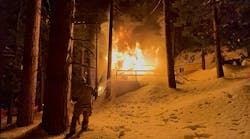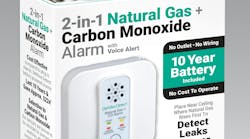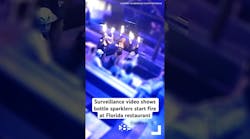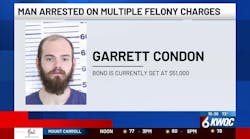During the holidays, decorations that use electricity are a cause for concern. Many fires that involve holiday decorations with electricity are preventable. In part one (November), we discussed electricity and safety devices that are available to help prevent electrical fires. In part two, we look at some of the more common electrical fires and how firefighters can teach the public to prevent them.
Lighting is one area of concern. Over the years, lighting has become much safer with the use of light-emitting diodes (LEDs) for lighting. They are very efficient and do not produce the heat that the older incandescent lights made. The gauge of the wiring on LED lights is smaller, making it easier for them break inside the insulation after several years use. It might be safer to consider replacing the inexpensive lighting every few years with a new string of lights.
Read the safety precautions on the packaging of the light and other directions. Do not exceed the recommend maximum strings to be attached to one another. I highly recommend using lighting with the Underwriters Laboratories (UL) seal of approval.
If using outdoor lighting, I recommend the use of a separate plug in outlet strip with a separate circuit breaker. If the strip is not being plugged into a ground fault circuit interrupter (GFCI) outlet, there should be a separate plug-in adapter for that too. Both can be found at home improvement centers. With the separate circuit breaker, if the amp limit on the strip is exceeded, it will shut off, which is added protection. With the GFCI, if someone comes into contact with the decoration while it is wet, it will immediately shut off preventing electrocution. This is a must for areas where it rains or snows during the holidays.
Another device that should be considered is a plug-in timer, which will turn off decorations off and on automatically. They should be programmed to shut off when occupants are sleeping.
Extension cords are used widely during holidays, many times for heating in addition to decorations. The main concern with extension cords is to use an adequate one that will carry the load needed for your decorations or devices. The diameter of the extension cord (gauge) must be larger than the wire of the device or lights. Users should also increase the gauge (lower number) if an extension cord is very long.
All decorations and other electrical devices and wiring should be inspected frequently to ensure that are no tears in the insulation or frayed wiring. Teach people to hold the wiring in their hands from time to time to see if the wiring is warm or hot. A hot wire indicates the load is high and the wire gauge is not adequate, so they should go to the next size (lower number). The use of extension cords for appliances, especially space heaters, should be avoided.
If a circuit breaker (or fuse, if they still have them) keeps shutting off during the holidays, this is an indicator that something is wrong and attention is needed immediately to determine the cause. If the circuit breakers continues to shut off after some changes have been made, a qualified electrician should be consulted for help as there may be something going on with wiring in concealed places, which may lead to a fire.
Another type of electricity to be concerned about during the holidays is static electricity. Because of heating devices being used indoors during the holidays, the air inside buildings tends to be dry, leading to more instances of static electricity. This is a real concern if a live Christmas tree is in the building. If the tree is not adequately watered, it can dry out and catch fire because of static electricity. I have been on fires of this type in the past; they are extremely fast and hot. Also, a humidifier can be used to help increase the moisture in the building.
Fire prevention tips
Here are some other holiday electrical safety tips:
• Do not run electric cords under carpets or across doorways
• When you are not going to be home or when you go to sleep at night, shut off all electric decorations.
• Feel the outlet and cords from time to time to see if they are warm or hot, which is an indicator of overload
• Never exceed safety recommendations on the packaging that accompanies any of your electric decorations
Indications of potential electrical problems:
• The frequent shutting off of circuit breakers or blown fuses
• An unusual burning smell with no obvious smoke
• Flickering or dimming lights
• Wires and outlets that are warm or hot to the touch
• Discoloration of or sparks from a wall outlet
pull quote:
Many fires that involve holiday decorations with electricity are preventable.





